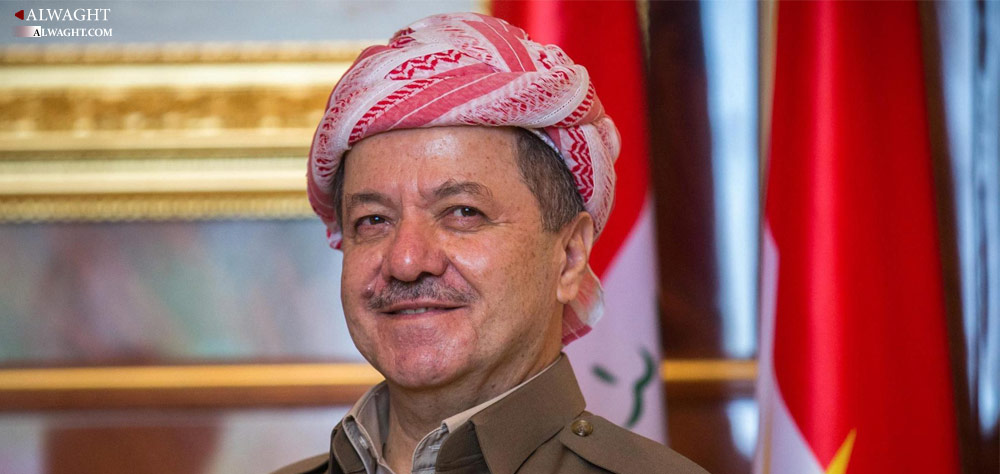Alwaght- The President of Iraq's Kurdistan region Masoud Barzani made a statement on November 20, 2016, that carried a message different from his earlier statements made particularly in 2015 and 2016. The key points of the statement can be categorized in three levels: first, it contained a call on the political parties to once again plan for dialogue between them. It also demands the Kurdish region’s parliament to be reactivated after a year of troubles, and a new speaker is picked for it. The second point is a call for the political parties of the region to renew efforts to form a new government in a bid to pull the country out of the fragile conditions it is suffering from. The third point was a request from the Kurdish political parties to choose a new president for Kurdistan to replace Barzani.
These three points were deemed to be different from contents from the earlier statements made by Kurdistan president. The statement indicates that Barzani has an understanding of the critical circumstances of the autonomous region.
Perhaps the most significant part of this statement can be outlined in a couple of other key points: first, the statement is an admission of critical conditions of Kurdistan region. Second, it displays concerns about endangerment of the democratic governance principles in the Kurdish region that showed sign in the parliament’s failure. And third, the statement shows Barzani's agreement with picking a new president for the region. The president's post has been a source of rifts between different Kurdish parties during the past two years.
A statement meant to admit the Kurdish region’s realities
In first view on Barzani’s statement, we can suggest that it is a kind of admission of the realities of Kurdistan region. In other words, Barzani’s statement is not a weird and different message, rather, it is an emphasis on the Kurdish region’s constitutional principles and political processes beside accepting the facts about the political, economic, social, security, and military pressures that press the general atmosphere of Kurdistan region. In its constitution the region considers the power sharing, the role of parliament, position of the region’s president, and the periodic power transfer. However, due to party and political rifts, all these principles are suspended. In fact, Barzani’s statement is only an approval of these political and legal principles. Additionally, the message by Barzani is an indicative of intensity of the political, economic, and security strains that currently Kurdistan– as well as Iraq itself– is grappling with. From this viewpoint, the statement can be deemed to be a ray of hope for a return to the rule of law which for some time has been thrown away by the Kurdish political forces.
A promotional and propaganda tool
Still from another dimension, Barzani’s message can be regarded as a media propaganda instrument. With a look at the present Kurdistan region’s situation, we can easily understand that a heavy pressure is troubling this political system. Domestically and socially, huge criticism is directed against the political governance, specifically the ruling Kurdistan Democratic Party and the President Masoud Barzani. The crisis of deteriorated living conditions, the Gorran (Change) party’s pressures for direct talks between central Iraqi government and the Kurdistan's cities instead of with the Kurdistan government, ISIS crisis, strains on Barzani for failing to hold the independence referendum and changing it to a political and social promotion for own party’s benefits, accusing Barzani and his party of stepping out of the democratic course, and Barzani’s failure to step down from power, all these are only part of the cases of domestic pressures and criticism against the region’s presidency and the political system. Certainly, beside Kurdistan Democratic Party and Barzani as a president other parties like Gorran and Patriotic Union of Kurdistan can be blamed for the region’s immersion in such circumstances.
It is in this situation that Barzani has put forward demands for efforts for settling the problems, reactivating the parliament, and agreeing upon a new president. Actually, his major aim could be launching a propaganda and easing pressures that are building on the government and him. By this statement, Barzani seeks ridding himself from criticism and indicating that he was not to blame for the region’s troubles. As the grave conditions develop in Kurdistan, Barzani seeks pretending that he is demanding change to rid the region of the current crisis but some trouble-making figures and parties are resistant to reform and change.
In general, Barzani’s statement found reception among the Kurdish parties and figures. Positively looking at it, they see it a window of relaxation and moving out of the current intricate situation. Although his suggestions and demands in the statement were received with a critical view, on the other side the political forces including the rival parties took them as new steps and daring measures that gave new hopes for getting the democracy back on the track in Kurdistan and breathing a new life into the main governance institutions like the parliament.



























